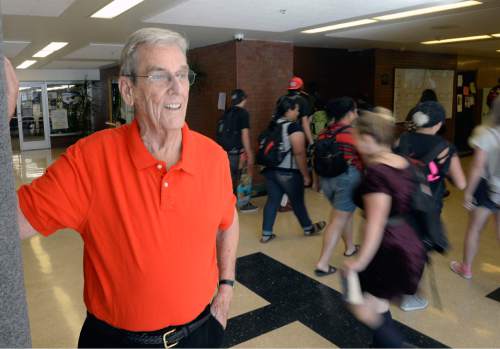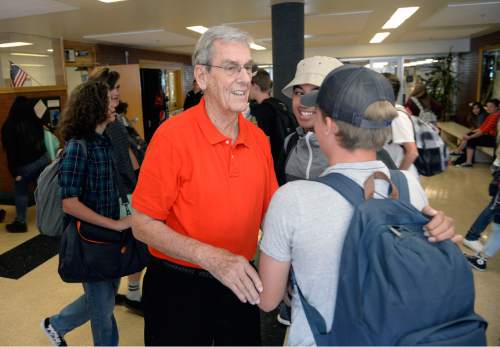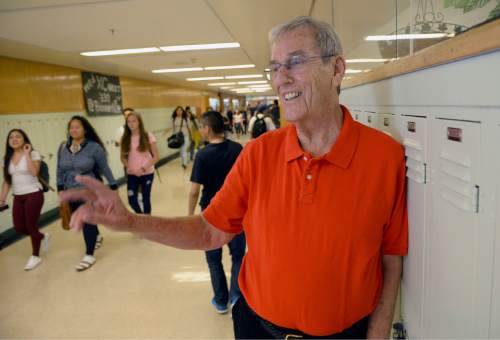This is an archived article that was published on sltrib.com in 2016, and information in the article may be outdated. It is provided only for personal research purposes and may not be reprinted.
Highland High began its 61st year when the new school year began last month. And so did counselor Dean Collett, who started as a math teacher when the school opened in 1956 and never left.
"I've just always loved the school," the 88-year-old educator said. "I never wanted to go anywhere else."
Highland and Collett began their 60-year-old union when the east Salt Lake City school was freshly built on a site near where riots had occurred at the old territorial prison just a few years earlier.
"We took kids from East and South [high schools]," Collett said. "But when I started, we just had seventh-, eighth-, ninth- and 10th-graders because the older classes wanted to stay at the schools where they began and graduate with their friends."
When Highland gained its full student body through the 12th grade, Collett's duties expanded to include German.
"I served in the Army in Germany during the Korean conflict period, so they thought I could teach German as well."
Later, he was asked to teach Russian.
"I had gone on a mission to Sweden [for The Church of Jesus Christ of Latter-day Saints] and spoke that language," he said. "They wanted a Russian program and decided [Swedish] was close enough."
He signed up for a night class at the University of Utah and stayed just ahead of his students as they learned Russian together. That summer, he took more comprehensive courses at San Francisco State so he could be better versed when the next batch of students arrived.
Collett taught German and Russian until the mid-1980s, when he became a counselor, a position he has held ever since.
"He has saved many kids who were lost or confused or getting into some trouble," said University of Utah professor Pat Shea, an attorney and former Democratic Party state chairman. "I was one of them."
Shea was arguing with his teachers too much when he was a Highland student in the 1960s. Collett, who had taken Shea on one of his annual trips to Russia with his students, intervened, and, with other teachers, got the youth enrolled in debate, where he could channel his precociousness in a more positive direction.
There, Shea excelled.
When Collett began his Highland career, the girls wore poodle skirts and bobby socks. Many of the boys wore ties to school. It was a far cry from the tattoos and piercings many kids sport today.
But the character of the students hasn't changed, he says. "They're still basically the same."
What has changed is the school's diversity.
"When I began, we took kids just from the east side of the city and the student body was practically all white," he said. But when South High School closed [in 1988], we took a lot of their kids from the west side, and now our population is more than a quarter minorities."
To Collett, that richness has strengthened the school.
"When we started getting minorities, it added a great deal to the school," he said. "We incorporated them into the Highland community. We helped them feel loved. And we adapted to them as they adapted to Highland."
Besides his teaching and counseling duties, Collett for years was the faculty adviser to the yearbook staff and the cheerleaders. In his decades at Highland, he has never missed a Rams football game.
Collett never married. He is wedded to the school and the generations of students he has taught.
Ten years ago, he was poised to retire, but school officials asked him to stay to initiate and direct the new "Freshman Success" program.
"It's a comprehensive program where we help freshmen adjust to high school," he said. "We work with them during the year, help those kids falling through the cracks, find tutors and work weekly with those struggling with math, science and language arts."
Other schools are now using Highland as a model for their own programs to help newcomers.
Will Collett ever retire?
"I love the classroom, and I love counseling," he said. "Every year has been special to me. At the beginning of every year, I come alive. I walk into the building and the memories flow constantly. There have been exciting times. There have been sad times. I've spoken at funerals. I've spoken at [Mormon mission] farewells. I love watching the kids go forward. I love watching them succeed."







